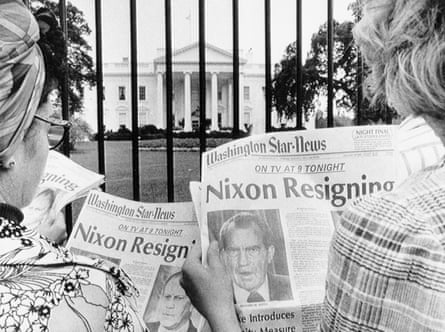In the last several weeks, there’s been an uptick in the Trump authoritarianism talk. Matt Yglesias kicked it off the day after Christmas, claiming that Trump had “consolidated power over the institutional Republican party” and was now organizing “an authoritarian regime”.
The New Year brought an article (“2018 Will Be a Fight to Save Democracy”) and a tweet from Jonathan Chait: “I read ‘How Democracies Die.’ It convinced me our democracy is more precarious than it looks.”
A few days later, Yglesias went in for the kill:
So far, Trump has been extremely long on demagogic bluster but rather conventional – if extremely right-wing in some respects – on policy. But…this is entirely typical. Even Adolf Hitler was dismissed by many as a buffoon.”
Many of Hitler’s opponents did initially dismiss him as a buffoon. But one year into power? They either were dead, in concentration camps or running for their lives.
Ironically, in the same article, Yglesias offers an excellent if unintentional rebuttal to his own analogy:
Public opinion polling suggests that the merged Trump-establishment party is hideously unpopular and headed for electoral defeat. If that happens and Democrats gain control of at least one house of Congress, then the system of checks and balances will begin to operate as designed.”
Imagine a comparable passage in January 1934, one year into Hitler’s reign of terror. It only works as satire or science fiction.
Dreaming of Hitler
As soon as Trump became a serious contender for the presidency, journalists and historians began analogizing him to Hitler. Even the formulator of Godwin’s Law, which was meant to put a check on the reductio ad Hitlerum, said: “Go ahead and refer to Hitler when you talk about Trump.” After Trump’s election, the comparisons mounted, for understandable reasons.
But as we approach the end of Trump’s first year in power, the Hitler analogies seem murky and puzzling, less metaphor than mood.
Just consider that this was a year that saw:
- The opposition party win important by-elections in two southern states.
- A media more independent and critical of the administration than at any point in the last quarter-century (especially compared to the Bush years, which posed a far more severe threat to freedom of the press).
- Continuous scrutiny and challenge from the courts.
- A relatively novel willingness by a unified Democratic party to oppose the Republicans.
- Blistering defeats for the president, his party, and the broader right-wing movement.
- An increasingly high number of Republican retirements in Congress, creating the possibility of a Democratic takeover of the House in 2018.
Perhaps some literalness is in order.
On the 354th day of Hitler’s reign
On 19 January 1934, the 354th day of Hitler’s reign, the Nazi regime closed the Kemna concentration camp, where anywhere from 2,500 to 5,000 political prisoners – most of them Communists, Socialists, and trade unionists – had been held and tortured (the press spoke obliquely of “enhanced interrogations”) for months. People could hear the prisoners’ screams from almost a half-mile away. The prisoners were moved to other concentration camps.
On 9 January 2018, the 354th day of Trump’s reign, the president was anxiously monitoring news of a best-selling book – filled with leaks from his own top advisers, testifying to the addled state of his mind and rule – hoping against hope to stop any and all discussion of his fitness for office.
Trump’s lawyers had already tried to force the book’s publisher and author to cease publication, issue a retraction, and apologize. Their reply? We “do not intend to cease publication, no such retraction will occur, and no apology is warranted”.

A day in the life of an authoritarian presidency
In the course of one day of Trump’s presidency, we saw a federal court strike down, for the first time in American history, the congressional map of a state on the grounds that the legislature had gerrymandered district lines for purely partisan purposes.
In an opinion authored by three judges, including one Republican appointed by George W Bush, the court held that the Republican-controlled North Carolina legislature violated the constitution when it drew up the state’s 13 congressional districts. The legislature was ordered to redraw the state’s district lines on a less partisan basis, potentially threatening Republican control of the state’s congressional delegation.
On the same day, Trump’s plans to amass data on voter fraud – in a desperate bid to prove that he was the rightful winner of the popular vote in 2016 – were stymied for a second time.
After being forced last week to disband his commission on voter fraud because of mounting lawsuits and the refusal of most states – under both Democratic and Republican control – to cooperate with it, Trump was forced to destroy the commission’s data.
The administration had threatened to turn what data it had over to the Department of Homeland Security, raising concerns about how the department might use that information to intimidate voters. Thanks to the persistent opposition of a Democratic official in Maine, the administration had to give up those plans.
Also that day, Trump was forced to back down from his plans for offshore oil drilling in Florida after the state’s Republican officials raised an outcry.
Immediately following that concession, lawmakers up and down the eastern and western seaboards – both Democrat and Republican – began demanding similar exemptions for their states, raising the possibility that Trump’s long-held plans for more oil drilling might collapse.
A new birth of freedom?
Indeed, for all the talk of increasing authoritarianism and Republican hegemony, there are signs that the United States is more open and freer today – and the Republicans less hegemonic – than it has been a while.
Exactly 30 years ago, the name ACLU, which stands for the American Civil Liberties Union, was so radioactive it became a lethal accusation, in the hands of Republican candidate George HW Bush, against Democratic candidate Michael Dukakis.
Invoking the rhetoric of McCarthyism, Bush, the gentlemanly moderate, called Dukakis a “card-carrying member of the ACLU”.
So vulnerable was Dukakis to the widespread belief that civil liberties and constitutional values were unpatriotic – so terrified and flummoxed was he by the charge – Aaron Sorkin was led to fantasize, in a speech by Michael Douglas in a movie, the Sorkin-esque response Sorkin wished Dukakis would have given to Bush.
Today, the ACLU is so popular and esteemed – membership quadrupling to 1.6 million, fundraising off the charts – it’s positioning itself to become a major political force in the Democratic party, like the National Rifle Association is to the Republican party. According to its executive director: “It’s clear that a larger portion of the American public is engaged in politics in a way they’ve never been before.”
A little bit more than 20 years ago the Republicans controlled Congress but not the White House. But so powerful – and threatening to the prospects of Bill Clinton’s reelection – were they, they were able to force the Democratic president to sign a rollback of the welfare state as dramatic and draconian as anything passed by Ronald Reagan.
Today, the Republicans are in full control of the federal government.
Instead of launching an assault on the welfare and entitlement state, as many of them had promised after their tax cut, they’ve announced defeat without ever having tried for victory.
“Besides the possibility of an infrastructure bill,” one of their most rightwing leaders acknowledges, “the only two things that will probably get done are an immigration deal and keeping the lights on in the government”.
And even some of that looks like it’s in doubt.

A steady diet of Dostoevsky
There’s little doubt that Trump’s regime is a cause for concern, on multiple grounds, as I and many others have written. But we should not mistake mood for moment. Even one that feels so profoundly alien as ours does now. For that, too, has a history in America.
During the Vietnam and Nixon years, Philip Roth recalled in 1974, many Americans had a:
sense of living in a country with a government out of control and wholly in business for itself. Reading the morning New York Times and the afternoon New York Post, watching the seven and then the 11 o’clock – all of which I did ritualistically – became for me like living on a steady diet of Dostoevsky …
One even began to use the word ‘America’ as though it was the name not of the place where one had been raised to which one had a patriotic attachment, but of a foreign invader that had conquered the country and with whom one refused, to the best of one’s strength and ability, to collaborate. Suddenly America had turned into ‘them’ ….
… Of course there have been others as venal and lawless [as Richard Nixon] in American politics, but even a Joe McCarthy was more identifiable as human clay than this guy is. The wonder of Nixon (and contemporary America) is that a man so transparently fraudulent, if not on the edge of mental disorder, could ever have won the confidence and approval of a people who generally require at least a little something of the ‘human touch’ in their leaders.
It’s strange that someone so unlike the types most admired in the average voter … could have passed himself off to this Saturday Evening Post America as, of all things, an American.”
- Corey Robin is the author of The Reactionary Mind: Conservatism from Edmund Burke to Donald Trump
